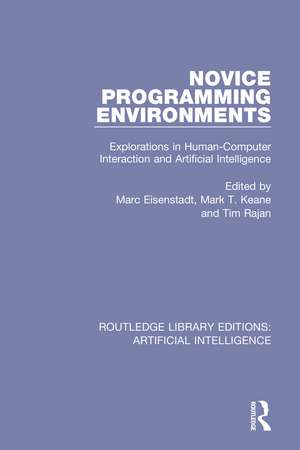Novice Programming Environments: Explorations in Human-Computer Interaction and Artificial Intelligence: Routledge Library Editions: Artificial Intelligence
Editat de Marc Eisenstadt, Mark Keane, Tim Rajanen Limba Engleză Hardback – 14 mai 2018
Another related strand taken in some of the work is the concept of "pre-emptive design", i.e. the provision of tools such as syntax-directed editors and graphical tracers which help programmers avoid many frequently-occurring errors. A common thread throughout the book is its Cognitive Science/Artificial Intelligence orientation. AI tools are used, for instance, to construct simulation models of subjects writing programs, in order to provide insights into what their deep conceptual errors are. At the other extreme, AI programs which were developed in order to help student debug their programs are observed empirically in order to ensure that they provide facilities actually needed by real programmers.
This book will be of great interest to advanced undergraduate, postgraduate, and professional researchers in Cognitive Science, Artificial Intelligence, and Human-Computer Interaction.
| Toate formatele și edițiile | Preț | Express |
|---|---|---|
| Paperback (1) | 323.23 lei 6-8 săpt. | |
| Taylor & Francis – 6 mai 2020 | 323.23 lei 6-8 săpt. | |
| Hardback (1) | 687.67 lei 6-8 săpt. | |
| Taylor & Francis – 14 mai 2018 | 687.67 lei 6-8 săpt. |
Preț: 687.67 lei
Preț vechi: 1031.48 lei
-33% Nou
Puncte Express: 1032
Preț estimativ în valută:
131.58€ • 137.38$ • 108.90£
131.58€ • 137.38$ • 108.90£
Carte tipărită la comandă
Livrare economică 04-18 aprilie
Preluare comenzi: 021 569.72.76
Specificații
ISBN-13: 9780815351627
ISBN-10: 0815351623
Pagini: 360
Dimensiuni: 156 x 234 x 28 mm
Greutate: 0.84 kg
Ediția:1
Editura: Taylor & Francis
Colecția Routledge
Seria Routledge Library Editions: Artificial Intelligence
Locul publicării:Oxford, United Kingdom
ISBN-10: 0815351623
Pagini: 360
Dimensiuni: 156 x 234 x 28 mm
Greutate: 0.84 kg
Ediția:1
Editura: Taylor & Francis
Colecția Routledge
Seria Routledge Library Editions: Artificial Intelligence
Locul publicării:Oxford, United Kingdom
Public țintă
Postgraduate, Professional, and UndergraduateCuprins
List of Contributors. Preface. Acknowledgements. Part 1: Design Issues in Programming Environments 1. Design Features of a Friendly Software Environment for Novice Programmers Marc Eisenstadt 2. Principles for the Design of Dynamic Tracing Environments for Novice Programmers Tim Rajan 3. A Fine-Grained Account of Prolog Execution for Teaching and Debugging Marc Eisenstadt and Mike Brayshaw 4. A New Metaphor for the Graphical Explanation of Forward-Chaining Rule Execution John Domingue and Marc Eisenstadt Part 2: Empirical Studies and Cognitive Models 5. Errors in an Interactive Programming Environment: Causes and Cures Marc Eisenstadt and Matthew Lewis 6. An Evaluation of ADT: An Animated Prolog Tracer for Novice Prolog Programmers Tim Rajan 7. Some Pitfalls in Learning About Recursion Hank Kahney 8. Naïve Iteration: An Account of the Conceptualizations Underlying Buggy Looping Programs Marc Eisenstadt and Joost Breuker Part 3: Artificial Intelligence User Aids 9. The Automatic Debugging of Recursive Side-Effecting Programs Joachim Laubsch and Marc Eisenstadt 10. Syntactic Debugging of Procedural Programs Tony Hasemer 11. Plan Diagrams as the Basis for Understanding and Debugging Pascal Programs Rudi Lutz 12. An Automated Programming Advisor John Domingue. Indices.
Descriere
This book, originally published in 1992, encapsulates ten years of research at the Open University’s Human Cognition Research Laboratory. The research investigates the problems of novice programmers, and is strongly oriented toward the design and implementation of "programming environments" aimed at eliminating or easing novices’ problems.











